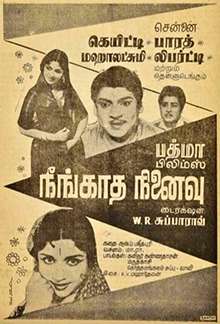Neengadha Ninaivu
Neengadha Ninaivu (transl. [An] Unforgetable Memory) is a 1963 Indian Tamil-language film, directed by W. R. Subba Rao.[2] It is a remake of the 1951 Hindi-language film Deedar. The film stars S. S. Rajendran, Kalyan Kumar, C. R. Vijayakumari and Pushpalatha.[3]
| Neengadha Ninaivu | |
|---|---|
 Poster | |
| Directed by | W. R. Subba Rao |
| Written by | Maa. Raa (dialogues) |
| Story by | Azm Bazidpuri |
| Starring | S. S. Rajendran Kalyan Kumar C. R. Vijayakumari Pushpalatha |
| Music by | K. V. Mahadevan |
Production company | Padma Films |
Release date |
|
Running time | 2:40:47 (14471.78 ft./4411m) |
| Country | India |
| Language | Tamil |
Plot
The story starts with a friendship between two young children. The girl is from an affluent family. She is friends with a poor boy. Both of them used to ride on a horse for fun. The girl's father does not like their friendship. One day he blames the boy that he pushed the girl off the horse. He forbids their meeting thereafter. The children grow up. The boy, now a young man, Kumar, lives in a farmer's house. Another farmer's daughter loves him. Kumar loses his eyesight in an accident. Kumar and the lover girl make their living by singing in the streets. Kumar comes to know an eye surgeon. The surgeon treats him and his eyesight is restored. The surgeon becomes friendly with Kumar. Kumar tells the surgeon about his childhood sweetheart. But when Kumar tells the name of his childhood friend, Mala, the surgeon is shocked because he himself is in love with Mala. Kumar comes to know that Mala has now become the lover of the surgeon. He blinds himself again and goes back to singing on the streets.[3]
Cast
The list is adapted from the review article published in The Hindu.[3]
|
|
Soundtrack
Music was composed by K. V. Mahadevan and the lyrics were penned by Vaali, A. Maruthakasi, Kannadasan and Kothamangalam Subbu. Playback singers are P. Susheela, L. R. Eswari, T. M. Soundararajan and P. B. Srinivas. The song Netru vandhu Indrirundhu Naalai Pogum is the first Vaali's song sung by T. M. Soundararajan.[4]
The song Chinnagnchiru Malarai Maranduvidaathe set to the tune of the Hindi version song "Bachpan Ke Din Bhoolana Dena" composed by Naushad, was a hit.[3]
| No. | Song | Singer/s | Lyricist | Duration (m:ss) |
|---|---|---|---|---|
| 1 | Oh .. Oh .. Chinnagnchiru Malarai Maranduvidaathe | P. Susheela & L. R. Eswari | Vaali | 03:04 |
| 2 | Netru vandhu Indrirundhu Naalai Pogum | T. M. Soundararajan | 03:24 | |
| 3 | Oh .. Oh .. Chinnagnchiru Malarai Maranduvidaathe - another version | 01:17 | ||
| 4 | Paarthathundaa Kettathundaa | L. R. Eswari & group | A. Maruthakasi | 02:28 |
| 5 | Kan Paarvai Kavi Paadum | P. Susheela | 03:26 | |
| 6 | Engiruntha Pothum Unnai Marakka Mudiyumaa | 03:08 | ||
| 7 | Un Kathaiyum En Kathaiyum | T. M. Soundararajan | 03:19 | |
| 8 | Anbu Vaazhga Aasai Vaazhga | T. M. Soundararajan & P. Susheela | Kannadasan | 03:22 |
| 9 | Kadhaiyai Kettadhum Maranthuvidu | P. B. Srinivas | Kothamangalam Subbu | 04:09 |
Reception
Film historian Randor Guy said the film is "Remembered for the performances of S. S. Rajendran and Kalyankumar.[3]
References
- Film News Anandan (23 October 2004). Sadhanaigal Padaitha Thamizh Thiraipada Varalaru [History of Landmark Tamil Films] (in Tamil). Chennai: Sivakami Publishers. Archived from the original on 24 November 2017.
- Ashish Rajadhyaksha & Paul Willemen. Encyclopedia of Indian Cinema. Oxford University Press, New Delhi, 1998. p. 622.CS1 maint: uses authors parameter (link)
- Guy, Randor (20 August 2016). "Neengatha Ninaivu (1963)". The Hindu. Archived from the original on 24 November 2017. Retrieved 24 November 2017.
- G. Neelamegam. Thiraikalanjiyam — Part 2 (in Tamil). Manivasagar Publishers, Chennai 108 (Ph:044 25361039). First edition November 2016. p. 128 — 129.